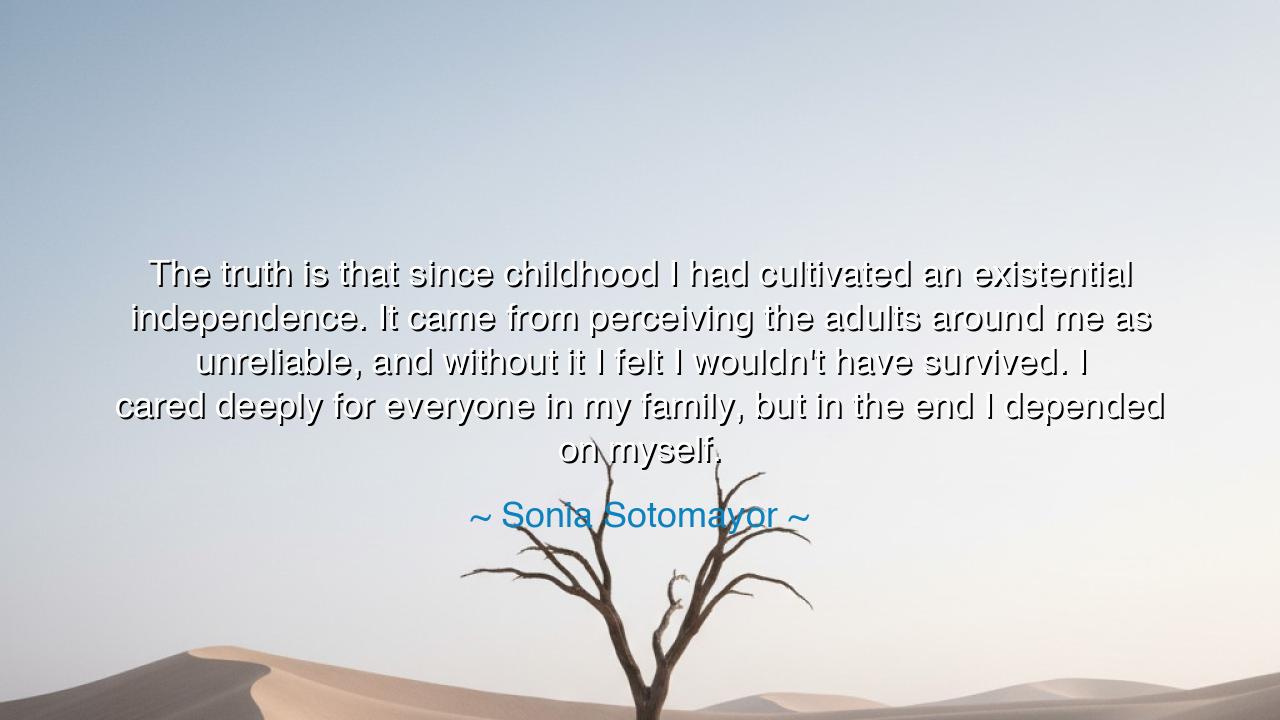
The truth is that since childhood I had cultivated an existential
The truth is that since childhood I had cultivated an existential independence. It came from perceiving the adults around me as unreliable, and without it I felt I wouldn't have survived. I cared deeply for everyone in my family, but in the end I depended on myself.






Host: The room felt quiet, the faint hum of the city outside drifting in through the open window. The soft light from the lamp cast long shadows across the walls, the evening stretching into something reflective and still. Jeeny sat by the table, a mug of tea held lightly in her hands, her eyes distant as she gazed at Jack across the room. He leaned against the window, arms crossed, his gaze fixed on the fading light of the horizon. The quiet between them was heavy, as if they were both waiting for the right moment to speak.
Finally, Jeeny broke the silence, her voice calm but intentional.
Jeeny: “I came across a quote today by Sonia Sotomayor. She said, ‘The truth is that since childhood I had cultivated an existential independence. It came from perceiving the adults around me as unreliable, and without it I felt I wouldn’t have survived. I cared deeply for everyone in my family, but in the end I depended on myself.’ What do you think about that?”
Jack: (pauses, his expression thoughtful) “It’s a powerful statement. It sounds like she’s saying that independence was almost a necessity, not just a choice. That it came from seeing the people around her as unreliable, so she had to rely on herself to survive. I can’t imagine what that would have felt like—being so deeply aware that you could only depend on yourself.”
Jeeny: (nodding, her voice steady) “It’s a form of survival, isn’t it? But I think it’s also a form of resilience. Sonia Sotomayor was forced to create that independence, not out of desire, but out of necessity. And even though she cared for her family, she had to understand that in the end, she could only rely on her own strength. It’s a hard truth, but it’s also empowering.”
Host: The quiet between them grew deeper, the weight of Sotomayor’s words settling in the air, filling the room with a kind of understanding. Jeeny’s gaze never wavered from Jack, her expression soft but filled with a quiet knowing. Jack, however, stood still, his arms crossed tightly, as if absorbing the deeper meaning of the words.
Jack: (his voice quieter now) “I understand what she’s saying, but it sounds like a lonely way to live. Independence at that level—thinking that you have to rely on yourself, that others can’t be counted on—doesn’t that create a kind of distance from people? It seems like it could be hard to open up to anyone after that, hard to trust.”
Jeeny: (gently) “It’s not about shutting people out, Jack. It’s about understanding your own worth and your own strength. Yes, she had to rely on herself, but I think it was because she had no other choice. And once you’ve built that kind of resilience, it allows you to open up to others without the fear that you won’t be able to handle life on your own. It’s not a wall—it’s a foundation.”
Jack: (pausing, his voice more reflective) “A foundation, huh? I guess that makes sense. It’s like… once you know you can stand on your own, it gives you the freedom to let others in, without feeling like you’re going to crumble if they don’t live up to your expectations. But it still sounds like a hard way to grow up, without having someone you can count on when you’re struggling.”
Jeeny: (nodding, her voice soft but filled with understanding) “It is hard. But I think for her, the lesson wasn’t just in surviving—it was in thriving. She realized that even when the people around her were unpredictable, she had the strength to stand on her own. That strength is what allows her to connect with others now, without losing herself. It’s not about detachment; it’s about empowerment.”
Host: The room seemed to settle into a deeper understanding, the words lingering in the air like a quiet truth. Jack turned toward Jeeny, his posture softening as he absorbed her perspective. The idea that independence could be both a form of survival and a source of strength was beginning to feel less like a burden and more like a tool.
Jack: (with a slight smile, his voice quieter) “I see now. She had to build herself up from the ground, piece by piece, because the world around her wasn’t always dependable. But that independence didn’t isolate her—it gave her the power to connect with others from a place of strength, not need.”
Jeeny: (smiling softly, her voice gentle) “Exactly. And sometimes, when you can stand on your own, you don’t need to rely on others to feel whole. That’s when you can truly share yourself, without fear or expectation.”
Host: The soft light in the room seemed to deepen, casting long shadows as the world outside continued on, unaware of the subtle shift that had taken place within. Jeeny and Jack sat in the quiet of their understanding, the weight of Sonia Sotomayor’s words resonating between them. In that moment, independence was no longer a shield to protect from the world, but a foundation upon which to build deeper, more authentic connections.
The room, once filled with uncertainty, now felt still and calm, as if the conversation had created a new sense of clarity.






AAdministratorAdministrator
Welcome, honored guests. Please leave a comment, we will respond soon